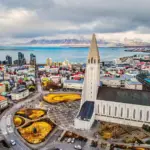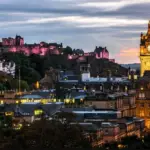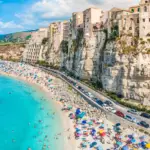
According to the Global Peace Index, Iceland and the safest country in the world to visit. With a population of around 360,000 and an area of 103,000 km², Iceland is known for its natural beauty, such as volcanoes, geysers, waterfalls, and auroras.
THE Iceland is an isolated country in the far north of Europe, known for its stunning landscapes, geysers, glaciers, and northern lights. Furthermore, it is classified as the safest country in the world, with a high quality of life and low crime rate.
The inhabitants of Iceland enjoy peace and security in a naturally peaceful environment, with a culture of trust and cooperation permeating society. In this section, we will explore the reasons behind the reputation of Iceland as the safest country in the world.
Main Conclusions:
- Iceland is ranked as the safest country in the world
- THE low crime rate and the culture of trust and cooperation contribute to the feeling of security of Iceland's inhabitants
- Iceland's natural and isolated environment also plays an important role in building a peaceful and safe society.

Location and Context of Iceland
Iceland is located in the far north of the Atlantic, between Greenland and continental Europe. It is the second largest island country of Europe and has a total area of 103,000 km². The capital, Reykjavik, is the northernmost city in the world, located just 2 degrees below the Arctic Circle.
Iceland's historical context is marked by a history of geographic isolation and cultural. The island was colonized by the Norse in the late 9th century, and since then, it has developed its own culture, based on oral traditions and epic sagas. Even today, the Icelandic language is the oldest Norse language in use and holds great cultural and social importance in the country.
Iceland is also known for its unique natural landscapes, which include volcanoes, glaciers, fjords, and lava fields. These geographical features directly influence the culture and lifestyle of Icelanders, who have adapted to a harsh and challenging natural environment.
Historical Context of Iceland
"Iceland stands out for its history of isolation and autonomy, dating back to the Norse colonization. Icelandic culture is deeply rooted in values such as social equality, direct democracy, and the preservation of natural heritage."
These factors contribute to Iceland's relatively peaceful and safe country. The lack of external influences and strong social cohesion have helped build a society based on mutual trust and cooperation, which are essential for maintaining public safety.
In the next section, we'll discuss the safety metrics that put Iceland at the top of the list of the safest countries in the world.
Iceland Safety Indexes
Iceland is officially considered the safest country in the world, according to security indices. These indices are used to compare different countries around the world, taking into account different aspects related to security, such as crime, terrorism, and health risks.
According to the Global Peace Index, Iceland is the most peaceful country in the world, followed by New Zealand, Portugal, Austria, and Denmark. Furthermore, Iceland also ranks among the countries with the lowest homicide rates worldwide.
| Safety Indices | Ranking in Iceland | Global Ranking |
|---|---|---|
| Global Peace Index | 1st | 1st |
| Global Crime Index | 9th | 37th |
| Global Security Index | 1st | 1st |
These indices show that Iceland is in a privileged position in terms of security worldwide. The combination of low crime rate and a strong commitment to citizen safety are some of the key factors that make Iceland a safe and peaceful destination to live and visit.

Low Crime Rate in Iceland
Iceland is one of the safest countries in the world, with a low crime rate that contributes to the sense of security of residents and visitors. According to the Global Peace Index, Iceland ranks first out of 163 countries in terms of safety and peace.
The country has a strong and effective justice system, with a well-trained and respected police force. There are also preventive policies aimed at further reducing the crime rate, such as the Juvenile Crime Prevention Program, which helps identify at-risk youth.
Iceland has a zero-tolerance culture toward violence and crime, creating a safe and peaceful environment. This is reflected in the low rates of violent crime, robbery, and assault.
Iceland Public Safety
Iceland has a strong commitment to public safety and invests significantly in crime prevention and control measures. Furthermore, there is ongoing support for the police and judicial system to ensure that the law is applied fairly and impartially.
Iceland's public safety efforts are reinforced by a strong partnership between the police and the community. The police work closely with the local population to ensure crime prevention and resolution.
In short, Iceland's low crime rate and effective public safety policies demonstrate the country's commitment to ensuring the safety and well-being of its citizens and visitors.

Education and Social Welfare
Iceland is known for having one of the best education systems in the world. Education is free at all levels, from preschool to university, and education is compulsory for all children aged 6 to 16. Furthermore, teachers are highly valued in Icelandic society, being a highly respected and well-paid profession.
This commitment to quality education is reflected in the country's low illiteracy rate, which is virtually non-existent. The Icelandic population is also highly literate in English, which facilitates communication with people from other countries.
Social welfare is another important aspect of Icelandic society. The country has a universal health and social assistance system funded by the government. This system ensures that all citizens have access to medical care, regardless of their financial situation.
Furthermore, Iceland has progressive policies regarding women's rights and gender equality. Women hold leadership positions in various sectors of society and have equal rights with men in terms of salaries and career opportunities.
This commitment to education and social well-being helps build a safe and balanced society in Iceland.
Culture of Trust and Cooperation in Iceland
Iceland is known for its culture of trust and cooperation. These core values are instilled from childhood, through education, and through the country's social institutions. The atmosphere of trust that permeates society is one of the key factors that makes Iceland the safest country of the world.
In Iceland, cooperation is a common practice in everyday life. Citizens trust each other and work together to maintain the safety and well-being of the community. This cooperation is evident in many aspects of Icelandic life, from volunteer work in community services to collaboration between government and civil society organizations.
A culture of trust is also reinforced by government policies. Iceland has a transparent and democratic political system, where citizens have a voice on important issues. This openness and transparency in government contribute to public trust and a general sense of security.
Cooperation and trust are particularly evident in crisis or emergency situations. Icelanders are accustomed to facing adverse weather conditions, such as snowstorms and volcanic eruptions, and in these moments, cooperation is essential to ensure everyone's safety and well-being.
In short, the culture of trust and cooperation is one of the main reasons why which Iceland is a country so safe. This environment of mutual trust and collaboration is an example to be followed by other nations seeking to increase the security and well-being of their populations.

Natural Environment and Isolation
Iceland is a country with an incredible natural environment, known worldwide for its stunning landscapes and unique geology. This environment plays an important role in the country's security, since the population is small and concentrated in urban areas. geographic isolation It also contributes to the feeling of tranquility and security of the country's inhabitants.
Iceland's geography is shaped by its location on the Mid-Atlantic Ridge, the underwater mountain range that separates the tectonic plates American and Eurasian. It is one of the few places in the world where it is possible to see the junction between the plates, with the volcanic and geothermal activity that accompanies this process generating phenomena such as geysers, volcanoes, and hot springs.
THE geographic isolation Iceland's climate is also one of the reasons it's considered the safest country in the world. With a population of just 360,000, much of the country is made up of sparsely populated areas, such as mountains, glaciers, and lava deserts. This means it's easier to monitor and control the entry of people and goods into the country, reducing opportunities for crime.
Furthermore, Iceland is a country with a strong tradition of respect for the environment and local fauna and flora. Both citizens and visitors are encouraged to respect and preserve nature, which contributes to its preservation and the feeling of being in a safe and healthy place.

Safe Tourism in Iceland
In addition to being considered the country safer of the world, Iceland is also one of the tourist destinations most sought-after destinations today. With spectacular nature and unique activities, it's easy to see why many visitors are eager to explore this Nordic paradise.
However, tourist safety is a priority in Iceland. The Icelandic government strives to ensure that visitors can enjoy a safe and enjoyable experience. safe tourism and pleasant. Several safety measures are in place throughout the country to ensure tourists feel at ease.
For example, the Icelandic police are known for being reliable and helpful, and airport security is taken seriously. Furthermore, tourist attractions are frequently monitored to ensure safe conditions for visitors.
If you're planning a visit to Iceland, there are many safe and exciting attractions to experience. For example, you can visit the famous geothermal pools, like the Blue Lagoon, or take a tour to see the Northern LightsThere are also spectacular hiking areas and guided glacier tours that you can enjoy safely.
To ensure the best possible experience, it's important to follow safety guidelines. This includes respecting weather conditions, avoiding dangerous areas, and respecting the island's fragile nature. By taking these simple precautions, you can enjoy a safe tourism and amazing in Iceland.
In short, Iceland is one of the safest places in the world and a tourist destination An exciting place to visit. With reliable security infrastructure and magnificent natural attractions, visitors can relax and enjoy their vacation without worry. So, start packing your bags and discover for yourself why Iceland is the safest and most spectacular country in the world.

Conclusion
In conclusionIceland is arguably the safest country in the world. Safety is a fundamental aspect of Icelandic society, and this is reflected in every aspect of daily life.
With impressive safety and low crime rates, Iceland is a peaceful and serene place where residents and visitors feel safe. It's important to emphasize that the commitment to safety goes beyond public policy and is reflected in the Icelandic culture of trust and cooperation.
High-quality education and a strong commitment to social well-being also play an important role in building a balanced and safe society. Iceland's natural environment, with its stunning landscapes and geographical isolation, also contributes to the feeling of tranquility.
Safe tourism in Iceland
Tourism in Iceland is safe and enjoyable, with safety measures in place to ensure visitors' peace of mind. Plus, there are many safe and exciting attractions to explore, such as National park Thingvellir, Gullfoss waterfalls and Reykjadalur hot springs.
In short, Iceland is a truly exceptional country when it comes to security. It is an inspiring example of how a society can be built on trust, cooperation, and social well-being. For these reasons, Iceland fully deserves the title of safest country in the world.
FAQ
Why is Iceland considered the safest country in the world?
Iceland is considered the safest country in the world due to a combination of factors, such as low crime rates, a strong commitment to social welfare, a culture of trust and cooperation, as well as geographic isolation and the environment. stunning natural.
What is the geographical location of Iceland?
Iceland is located in the extreme northwest of Europe, in the North Atlantic region. It is a volcanic island situated between the Atlantic Ocean and the Norwegian Sea.
How do safety indices put Iceland at the top of the list of the safest countries in the world?
You Iceland's safety indexes, such as the Global Peace Index and the Corruption Perceptions Index, place the country at the top of the list due to its low crime rate, trust in institutions and transparency in government.
Why does Iceland have a low crime rate?
Iceland has a low crime rate due to a combination of factors, including an efficient justice system, strong investment in public safety, crime prevention policies, and a culture that values cooperation and mutual respect.
How do education and social welfare contribute to security in Iceland?
Iceland boasts a high-quality education system and a strong commitment to social well-being. These factors contribute to the formation of a balanced and conscious society, where individuals have access to resources and opportunities, thus reducing incentives for crime.
What is the role of a culture of trust and cooperation in Iceland's security?
A culture of trust and cooperation is a fundamental characteristic of Icelandic society. Mutual trust among citizens and collaboration on security issues contribute to strengthening public safety and fostering a sense of peace and security in the country.
How do Iceland's natural environment and geographic isolation influence security?
THE Iceland's natural environment, with its stunning landscapes and geographic isolation, contribute to the country's sense of tranquility and serenity. Geographic isolation limits the flow of criminals, while the peaceful natural environment fosters an atmosphere of security.
Is tourism in Iceland safe?
Yes, tourism in Iceland is safe. The country has safety measures for tourists, such as information on weather and road conditions, as well as a culture of respect and well-being. Visitors can enjoy peace of mind and security. of this country incredible.
Why is Iceland considered the safest country in the world?
Iceland is considered the safest country in the world due to a unique combination of factors, such as a low crime rate, strong investment in public safety, a culture of trust, cooperation among citizens, a stunning natural environment, and a high level of social well-being.
Lucas Wanderlust has a tireless spirit of adventure, always seeking new travel experiences. Fascinated by the world and the possibility of exploring unknown destinations, he fell in love with the sense of freedom and self-discovery that traveling alone provides. With a backpack on his back and a heart open to the unknown, Lucas embarks on exciting journeys, where each destination becomes a unique chapter in his life story. He gives himself body and soul to the magic of solo travel, inspiring others to follow in his footsteps and discover themselves through adventure.







